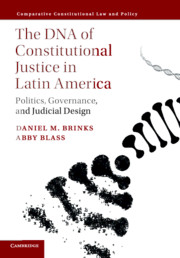Crossref Citations
This Book has been
cited by the following publications. This list is generated based on data provided by Crossref.
Dixon, Rosalind
2019.
Cómo comparar constitucionalmente.
Latin American Law Review,
p.
1.
Brinks, Daniel M.
Levitsky, Steven
and
Murillo, Maria Victoria
2019.
Understanding Institutional Weakness.
Sotomayor Valarezo, María Patricia
2019.
El poder constitucional en América Latina: hacia una tipología de las cortes constitucionales de la región.
OPERA,
p.
5.
Botero, Sandra
Ellett, Rachel
Keck, Thomas M.
and
Stohler, Stephan
2019.
Free Expression and Judicial Power in the Global South.
SSRN Electronic Journal ,
Antía, Florencia
and
Vairo, Daniela
2019.
La Suprema Corte de Justicia en Uruguay: entre instituciones formales e informales (1985-2018).
OPERA,
p.
27.
Brinks, Daniel M.
Levitsky, Steven
and
Murillo, María Victoria
2020.
The Politics of Institutional Weakness in Latin America.
Payne, Leigh A.
Pereira, Gabriel
and
Bernal-Bermúdez, Laura
2020.
Transitional Justice and Corporate Accountability from Below.
Côrtes, Lara
Gianella, Camila
Páez, Angela M.
and
Vallejo Piedrahíta, Catalina
2021.
Comparing Experiences of Constitutional Reforms to Enshrine the Right to Water in Brazil, Colombia, and Peru: Opportunities and Limitations.
Water,
Vol. 13,
Issue. 24,
p.
3519.
Páez, Angela M.
and
Vallejo Piedrahíta, Catalina
2021.
Channeling Water Conflicts through the Legislative Branch in Colombia.
Water,
Vol. 13,
Issue. 9,
p.
1214.
Ovares Sánchez, Carolina
2021.
El constitucionalismo dialógico, la consulta legislativa previa y el caso de Costa Rica.
Revista Derecho del Estado,
p.
215.
Macpherson, Elizabeth
Borchgrevink, Axel
Ranjan, Rahul
and
Vallejo Piedrahíta, Catalina
2021.
Where ordinary laws fall short: ‘riverine rights’ and constitutionalism.
Griffith Law Review,
Vol. 30,
Issue. 3,
p.
438.
Botero, Sandra
and
Gamboa, Laura
2021.
Corte al Congreso: Poder judicial y trámite legislativo en Colombia.
Latin American Research Review,
Vol. 56,
Issue. 3,
p.
592.
Gonzalez Ocantos, Ezequiel
and
Sandholtz, Wayne
2021.
International Human Rights Courts and Sources of Resilience: The Case of the Inter-American System.
SSRN Electronic Journal,
Botero, Sandra
Ellett, Rachel
Keck, Thomas M.
and
Stohler, Stephan
2021.
Free Expression and Judicial Power in Colombia, India, and South Africa.
Law & Social Inquiry,
Vol. 46,
Issue. 2,
p.
331.
Rossi, Julieta
and
Brinks, Daniel M.
2022.
Constitutionalism in Context.
p.
263.
Gonzalez-Ocantos, Ezequiel
and
Sandholtz, Wayne
2022.
The Sources of Resilience of International Human Rights Courts: The Case of the Inter-American System.
Law & Social Inquiry,
Vol. 47,
Issue. 1,
p.
95.
Vallejo Piedrahíta, Catalina
Luna Blanco, Tania
and
Velásquez Ocampo, Olga
2023.
Handbook on Legal Cultures.
p.
239.
Garcia Holgado, Benjamin
and
Sánchez Urribarri, Raúl
2023.
Court-packing and democratic decay: A necessary relationship?.
Global Constitutionalism,
Vol. 12,
Issue. 2,
p.
350.
2024.
The Entrenchment of Democracy.
p.
61.
Ginsburg, Tom
and
Versteeg, Mila
2024.
The Entrenchment of Democracy.
p.
100.



